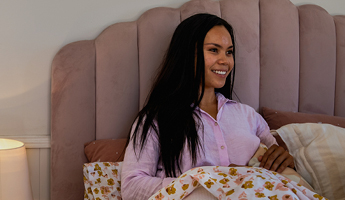Nocturnal enuresis is a fancy term for bedwetting and can impact anyone at any age. You might feel like you are the only one, however accidental loss of urine overnight is more common than you think. Speaking up about your symptoms is the first step to managing it.
Bedwetting can impact so many aspects of your physical and emotional wellbeing. It impacts your sleep, but also likely affects your desire to sleep next to someone or even go on holidays. Many women describe feelings of frustration, exhaustion, and embarrassment.
What is nocturnal enuresis?
Nocturnal enuresis is the involuntary loss of urine overnight. There is often a mismatch between bladder stretch, ability to maintain closure pressure at the bladder exit and urine production overnight. This can be coupled with a lack of awareness of the need to wee.
What are the symptoms of nocturnal enuresis?
If you have nocturnal enuresis, you will experience accidental loss of urine overnight, waking up wet. You may also experience the need to frequently wee overnight.
Nocturnal enuresis can be a continuation of bed wetting from childhood (primary) or can start at any age after a period of being dry overnight (secondary).
What causes bedwetting?
There is no one cause of bedwetting in the adult population. It is usually a combination of many factors that impact bladder stretch, urine production overnight and wakefulness to the sensation of needing to wee.
Some causes of bedwetting include:
Use of certain medication (Some can increase overnight urine production and others might have a sedative affect reducing your ability to sense the urge to go)
Neurological conditions (examples include diabetic neuropathy, Multiple Sclerosis, Parkinson’s disease)
Urinary Tract Infections (UTI)
Renal disease
Liver disease
Obstructive sleep apnoea
Substance abuse
Overactive bladder
Ageing
As you can see there are many reasons why you may be experiencing bed wetting. It is for this reason that new onset bed wetting as an adult should always be discussed with your doctor to rule out any underlying conditions.
How to stop bedwetting?
After diagnosing the root cause and treating any medical conditions (such as sleep apnoea or a urinary tract infections) treatment for nocturnal enuresis may involve:
Lifestyle modification:
Caffeine and sedative avoidance are recommended due to their impact on sleep, and alcohol due to its effects as a diuretic. Weight loss and regular physical activity are also aspects of management.
Bladder retraining:
This may involve a daytime toilet schedule and overnight use of a bed wetting alarm.Medications:
Medications recommended usually involve those that impact urine production overnight.Botox injections
Neuromodulation
Treatment should be holistic and target management of any underlying depression and anxiety, sleep hygiene and healthy daytime bladder habits. Some useful information on healthy bladder habit can be found here
Professionals involved in the management of nocturnal enuresis include your GP, a urologist and pelvic floor physiotherapist. If you are not sure how to find a pelvic floor physio, you can search for one in your local area using your postcode here
The bottom line
Bedwetting as an adult is described as embarrassing, exhausting and something that impacts all aspects of someone’s wellbeing. The causes can be multifactorial, so if overnight leaking is bothering you, it is important to discuss this with your doctor for further investigation.
This content is general in nature and not designed to substitute professional medical advice, diagnosis, or treatment.
Written for Poise by Caitlin Dunsford. Caitlin is a practicing Physiotherapist, with special interest and further training in Women's Health and Continence.







